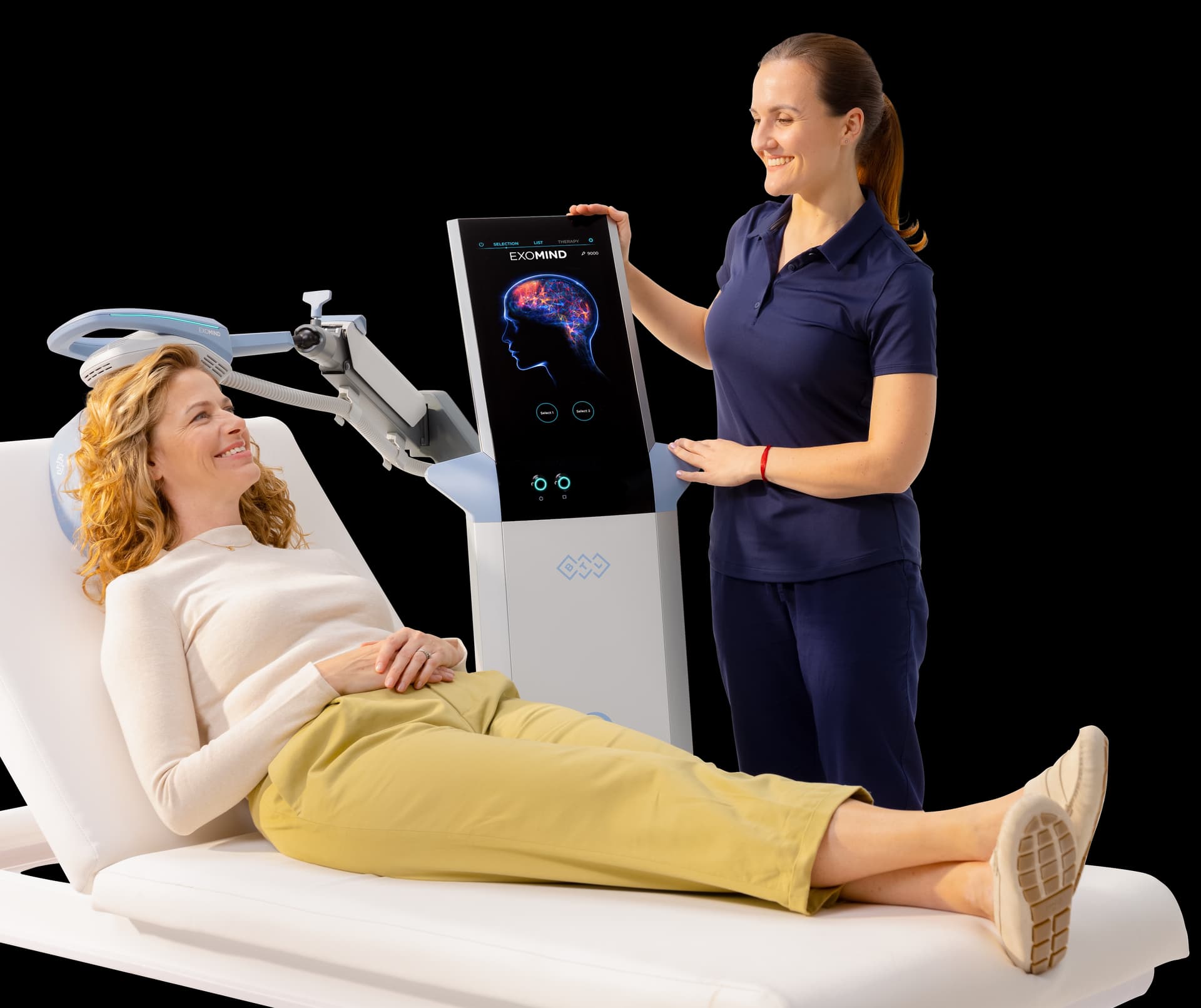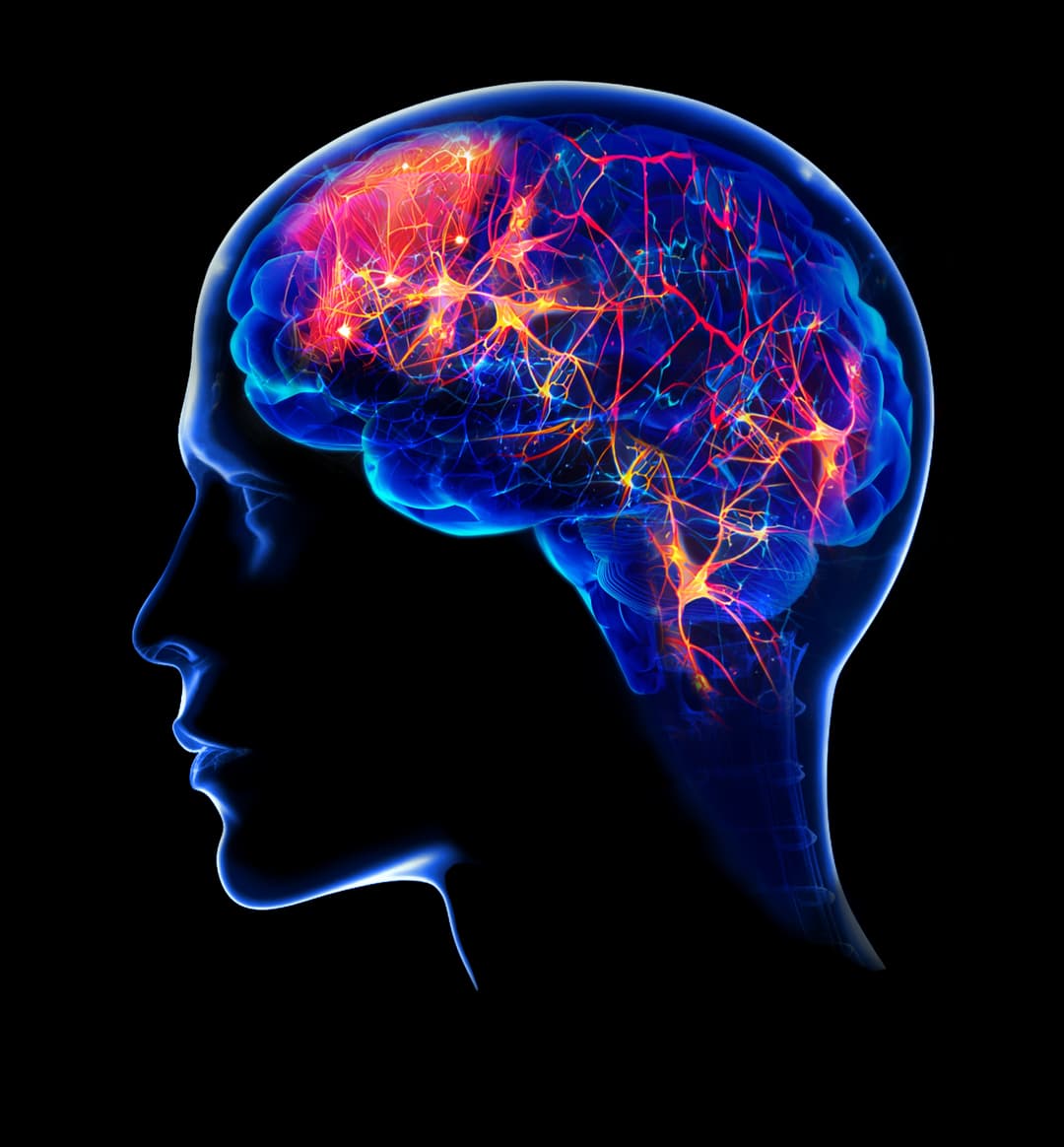Exomind TMS Treatment
Mental Clarity, Self-control & Emotional Balance
Exomind is a non-invasive, evidence-based brain stimulation treatment. It’s designed to support mental well-being, cognitive performance, and emotional regulation. Exomind technology is backed by 40 years of Transcranial Magnetic Stimulation (TMS) research, with over 17,000 published studies.
Delivered under clinical supervision at the London Psychiatry Clinic, Exomind offers a safe and modern way to enhance neuroplasticity. It can enhance the brain’s ability to adapt, learn, and recover from stress.

Exomind Cost & Treatment Pricing
- Exomind consultation with a psychiatrist (50 min): £500
- Exomind course of 6 sessions: £2,500
- Total treatment cost: £3,000 total (including consultation)
During the Exomind consultation, the psychiatrist will discuss any previous mental health history. This process ensures that every treatment plan is tailored to your individual needs and wellness goals.
Begin your Exomind journey today. Schedule an Exomind consultation with one of our experienced psychiatrists. Consultations are available either remotely or in person and typically last 50 minutes.
What is Exomind?
Exomind is a brain stimulation device. Exomind uses Transcranial Magnetic Stimulation (TMS) technology to gently activate and strengthen communication within key regions of the brain involved in mood, motivation, attention, and emotional processing. Exomind builds on FDA-cleared TMS protocols for depression and obsessive-compulsive disorder, and adapts these for a wellness and performance context.
This makes it suitable for individuals seeking to optimise brain health rather than treat clinical illness.
Exomind treatments are:
- Non-invasive, drug-free, and pain-free
- Walk-in, walk-out sessions with no downtime
- Delivered by trained clinicians in a safe environment
- Designed for cognitive optimisation, emotional balance, and stress resilience
How Does Exomind Work?
Exomind uses ExoTMS™, a multi-target, AI-enhanced version of transcranial magnetic stimulation (TMS). It stimulates the left dorsolateral prefrontal cortex (DLPFC), a key brain area for emotional regulation, motivation, and executive control.
This targeted stimulation helps promote state-dependent neuroplasticity, meaning it strengthens brain pathways when they’re most receptive to change. Over time, these changes can improve communication between areas of the brain that influence focus, mood, self-regulation, and cognitive flexibility.
Functions supported by TMS technology include:
- Emotional processing and regulation
- Cognitive control, attention, and working memory
- Planning, decision-making, and motivation
- Resilience to stress and mental fatigue

What is Exomind Suitable For?
Exomind for Depression & OCD
Exomind uses the same FDA-approved and CE-marked TMS technology licensed for:
- Major Depressive Disorder (Protocol 1)
- Obsessive–Compulsive Disorder (Protocol 2)
If your main diagnosis is depression or OCD, a psychiatrist will assess you to determine which clinical protocol is most appropriate and discuss the best treatment course.
Exomind for Mental Wellness
Protocol 3 is designed for individuals who want to enhance general mental wellbeing and cognitive performance. This protocol focuses on stimulating the left DLPFC, which may enhance mental clarity and emotional balance.
It may be suitable if you:
- Experience burnout, brain fog, or reduced ability to focus
- Want to strengthen emotional regulation and resilience
- Are managing high-stress roles, demanding schedules, or major transitions
- Are looking to optimise clarity, focus, motivation, and overall cognitive performance
It is important to note that this protocol is not licensed for the treatment of any specific mental health conditions.
What to Expect from Exomind Treatment
A standard Exomind course consists of six sessions, each lasting approximately 25 minutes.
- Quick, painless treatment
- You will be lying on a comfortable treatment bed
- No medication or sedation required
- Minimal side effects (most commonly mild scalp discomfort or transient headache)
- No downtime, and you can resume normal activities immediately

What Happens During the Exomind Consultation?
Your Exomind journey begins with a 50-minute consultation with one of our psychiatrists, available remotely or in person. This first step is an essential part of ensuring you receive the right protocol and treatment settings.
During the consultation:
- Review of your previous mental health history, if appropriate
- Discussion about your treatment goals for doing Exomind
- Discussion about the different Exomind protocols for your particular goals
- We can tailor your sessions to maximise neuroplasticity safely and effectively
- You gain access to medical expertise if you have questions about medications, mood, sleep, stress, or cognitive health
- Your safety and long-term wellbeing remain the priority, not just the immediate session
The consultation costs £500, and this is fully deducted from your package if you decide to proceed.
Begin your Exomind journey today.
Exomind Safety and Suitability
Exomind is safe for most people. It should not be used if you:
- Have metallic or electronic implants near the head (e.g. pacemakers, cochlear implants)
- Have a history of seizures or epilepsy (unless cleared by a neurologist)
- Are pregnant or have a brain tumour
- Are undergoing acute withdrawal from alcohol or substances
- Have a severe or unstable psychiatric condition
Our team can advise on suitability and liaise with your GP or psychiatrist if needed.
What Are the Benefits of Exomind?
TMS has been investigated for over 20 years and is recommended by the National Institute for Health and Care Excellence (NICE) guidelines for treatment-resistant depression and OCD when delivered under specialist supervision. Research shows measurable improvements in prefrontal-limbic connectivity, cognitive control, and mood regulation.
Exomind applies these same scientifically validated mechanisms to a wellness and performance context, with oversight from clinicians experienced in neurotherapeutics.
When applied for mental wellness, these same neuroplastic effects may support:
- Emotional balance and mood regulation
- Sharper concentration and attention
- Reduced stress and brain fog
- Better decision-making improves impulse control
- Better sleep quality, increased REM
- Neuroplasticity, BDNF increase
The Brain’s Natural Edits vs Renewal with Exomind

How does the brain change as we get older?
During our 20s and 30s, the brain becomes more efficient by trimming away connections that are less frequently used. This is known as “synaptic pruning”, which helps conserve energy, but it can also dim the pathways that once made learning effortless, creativity spontaneous, and emotional balance feel natural.
Over time, stress and routine can reinforce certain circuits while weakening others. This can influence how we experience motivation, calm, or clarity.
Why does neuroplasticity matter for wellbeing?
Research shows that the left dorsolateral prefrontal cortex (DLPFC) plays a central role in regulating positive emotion, clarity of thought, and emotional resilience. Stronger, more efficient connectivity within the DLPFC and deeper emotional networks is associated with higher wellbeing and improved cognitive performance.
As these networks become less active or less connected over time, it can lead to diminished creativity, reduced emotional flexibility, or a sense of feeling “less like yourself”.
How does Exomind support neuroplasticity?
Exomind uses targeted stimulation to promote neuroplasticity in the left DLPFC, helping reinforce the pathways that support clarity, motivation, and emotional balance. By strengthening communication within these networks, Exomind aims to restore the mental flexibility and balanced emotional tone that can fade with stress, age, or persistent overload.
Rather than altering who you are, Exomind helps refresh and strengthen the neural foundations that support your natural wellbeing and cognitive performance.